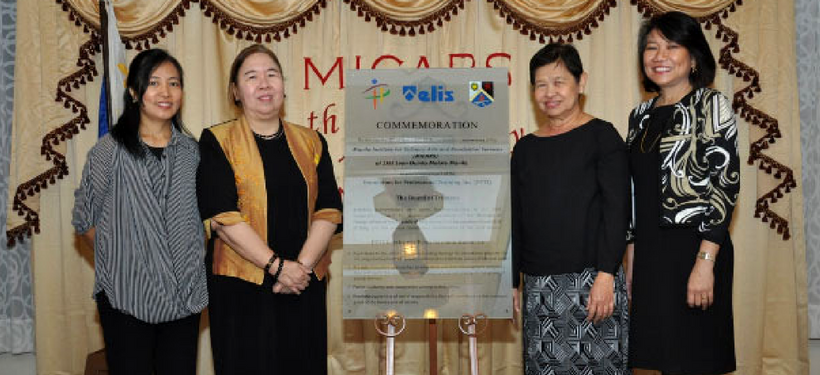
Carmita Eliza Icasiano narrates a momentous event in the history of Manila Institute for Culinary Arts and Residential Services (MICARS). Featured below is an article written on the occasion of MICARS’ 20th anniversary.
The Manila Institute for Culinary Arts and Residential Services celebrates two decades
Two decades is not a long time to throw a grand birthday bash. And yet, two decades is no mean feat for an endeavor like the Manila Institute for Culinary Arts and Residential Services (MICARS). Think of a young lady just stepping out of her teens, and now joining the ranks of the “young adult.” The chapters on childhood and adolescence come to a close, and a new one begins that brims of hope and promise. For MICARS, marking its 20th year is like a coming of age.
To think that in the last ten years or more, culinary schools have mushroomed in practically all major cities of Metro Manila, getting fancier, and attracting more and more of the high-income level secondary school graduates, who would offer stiff competition to their soon-to-be peers in the hotel management/food and service industry. MICARS stood its ground, and graduated students from less-resourced backgrounds who have found for themselves a means to live and support their families.
At MICARS’ celebration last November 25, 2015, MICARS parent May Bautista narrated her past– leaving Cebu in her teens to find work in Manila.
Rewind to that time: She lands a job as a cook, and meets her future husband, with whom she has four daughters. She and her husband learned about MICARS from her husband’s employer, who was a MICARS benefactor. They encouraged their eldest daughter, Nadine, to take the entrance test. She received a scholarship for two years, becoming part of MICARS first graduating batch in 1999.
Since graduation, Nadine, who is now in her thirties, has landed jobs in properties such as the Hilton, Marriott, and Crowne Plaza in upscale cities like Dubai and Singapore. Commitment to family led her to send her siblings to MICARS. Now, all her sisters are employed either abroad or in Manila.
Her sister, MICARS ’00 alumna Marilyn was for a time the first and only Asian chef in her workplace in Australia. May’s gratitude to the administration, faculty, and patrons of MICARS overflows. Addressing the audience, May stresses faith in God, the need to trust in the abilities of one’s children, hard work, and steadfastness in reaching one’s dream. Poverty is not a hindrance, she adds. She has, after all, seen it for herself.

Stories like this were echoed that evening by MICARS alumnae—how MICARS had given them a chance at securing an education despite having nothing at all. MICARS ’06 alumna Maryle Dordas Quiboy, now a production team supervisor at Papa Diddi’s Handcrafted Ice Cream, could not hold back tears as she recalls the fear of not being able to go to college for lack of means. She dreamt of finishing her studies, finding work and providing for her parents.
After a year of study In Tawili Training Center in Iloilo City, she was awarded a scholarship to take up a two-year course in Culinary Arts and Institutional Services at MICARS. Living far from home, she endured the separation and homesickness. But she was thankful that the management and staff at MICARS looked after their students well. “MICARS taught us how to take care of the little things, forming us physically, emotionally, and spiritually. I learned how to be independent and to be a strong woman as well. With the skills I learned in school, MICARS really as a big impact in my life.”
But Maryle credits MICARS not only for the skills and training that now give her the confidence to work anywhere. She is also thankful for the spirituality that MICARS imparts to its students. MICARS entrusts the spiritual formation of their students to Opus Dei, a Personal Prelature of the Catholic Church that helps people find God in the ordinary circumstances of one’s profession and daily life.
MICARS ’02 alumna Salve Zaragoza found her spiritual calling as an assistant numerary of Opus Dei while a student at MICARS. She saw the hand of divine providence behind the reversal of her family’s fortunes which compelled her to drop out of university where she was an Engineering student. At MICARS, she says that it is not just skills that you acquire but a discovery of God, and of one’s vocation.
MICARS students would perhaps not have come to such reckonings and appreciation of their school if it were not for the mentoring program that the Institute has in place. That evening, the Institute recognized the volunteer mentors who worked in the various service units operated by the Foundation for Professional Training, Inc. (FPTI) all over Metro Manila and Laguna. In gratitude not only for the mentoring program but for the entire educational opportunity granted them, MICARS’ alumnae presented the Institute Director Rowena Nazareno with a Php 150,000.00 donation.
MICARS also recognized its long-time patrons from two decades back for their unflagging support and effort. FPTI President Antonina S. Solomon acknowledged the work of Rosario Singian, Carmela Kintanar, Alice Lorenzo, and the late Lita Romualdez (who had just passed away a week before), represented by her daughter.

FPTI Executive Director Milagros Araneta provided a history of MICARS’ transitioning from its former appellation Maligaya Training Center, to Maligaya Institute, to the present Manila Institute. A section of her talk is quoted here:
“Maligaya Training Center was an initiative that started in the 1980s in a one-storey house in Maligaya Street in Malate, Manila, where informal skills training was offered to women domestic helpers to improve the services they render to families. To meet a growing demand for residential and institutional services from homes, hotels and restaurants, a new six-storey building with state-of-the-art equipment and facilities was established and completed in 1995 with financial assistance from the Italian Ministry of Foreign Affairs through the Italian-based nongovernmental organization Associazione Centro ELIS. Throughout the years, Maligaya Training Center received full accreditations from the Technical Education and Skills Development Authority (TESDA), and transitioned from its initial informal set-up to become Maligaya Institute for Culinary Arts and Residential Services. In the last 20 years, MICARS flourished with programs adapted to educational trends and job readiness requirements of the food service industry. It has graduated young women mostly coming from the poor sectors not only of Manila but neighboring provinces, and linked them to employment.”
As Maligaya evolves into Manila Institute, it opens its doors to potential students from ASEAN-member countries. The Manila Institute is fully authorized to accept and grant certification to foreign students. Present at the evening’s celebration was TESDA Director General Irene Isaac, who lauded the development, and yet emphasized the importance of keeping doors open to local students. Noting the quality of preparation for the workforce that MICARS offers its students, she stressed the need to enable students to render quality work in the Philippines. The aspiration to graduate more students to find employment in the food service industry was expressed by Helen Conti of Conti Specialty Foods, Inc. According to her, this sentiment is shared by other MICARS’ industry partners, such as Mary Grace Café whose Human Resource head was present at the celebration. Both Conti’s Pastry Shop and Restaurant and Mary Grace Café employ a number of MICARS and FPTI school graduates.
The celebration ended with the unveiling of the Institute’s new marker, bearing the name Manila Institute for Culinary Arts and Residential Services.
For an institute with two decades worth of history, MICARS modestly yet justly honored its patrons, benefactors, partners and alumnae that evening. Gratitude and joy overflowed. Quite fortunately, so did the red wine.
